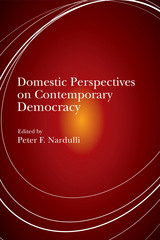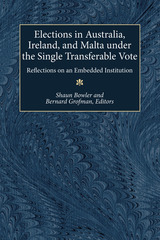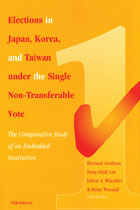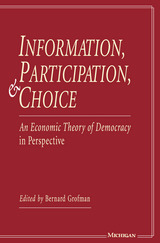
In looking at the remarkable proliferation of democracies since 1974, this volume offers important insight into the challenges and opportunities that democracy faces in the twenty-first century. Distinguished contributors detail difficulties that democracies face from within and how they deal with them. Among the contemporary threats to democracy emanating from internal sources are tensions arising over technology and its uses; ethnic, religious, and racial distinctions; and disparate access to resources, education, and employment. A democratically elected government can behave more or less democratically, even when controlling access to information, using legal authority to aid or intimidate, and applying resources to shape the conditions for the next election. With elections recently disputed in the United States, Mexico, Lebanon, and the Ukraine, debates about the future of democracy are inescapably debates about what kind of democracy is desired.
Contributors are W. Lance Bennett, Bruce Bimber, Jon Fraenkel, Brian J. Gaines, Bernard Grofman, Wayne V. McIntosh, Peter F. Nardulli, Mark Q. Sawyer, Stephen Simon, Paul M. Sniderman, and Jack Snyder.

Contributors to the volume are Shaun Bowler, David Farrell, Michael Gallagher, Bernard Grofman, Wolfgang Hirczy, Colin Hughes, J. Paul Johnston, Michael Laver, Malcom Mackerras, Michael Maley, Michael Marsh, Ian McAllister, and Ben Reilly.
Shaun Bowler is Professor of Political Science, University of California, Riverside. Bernard Grofman is Professor of Political Science, University of California, Irvine.

In addition to the editors, the contributors include Kathleen Bawn, John Boland, Jean-Marie Bouissou, Gary Cox, John Fu-Sheng Hsieh, Arend Lijphart, Emerson Niou, Steven R. Reed, and Frances Rosenbluth, among others.
Bernard Grofman is Professor of Political Science, University of California at Irvine. Edwin A. Winckler is at the East Asian Institute, Columbia University. Brian Woodall is Assistant Professor in the School of International Affairs, Georgia Institute of Technology. Sung-Chull Lee is Assistant Professor of Political Science, University of California at Irvine.

Since their publication in 1957, Downs's seminal ideas -- tweedledum and tweedledee politics and the "rationality" of political ignorance and nonparticipation on the part of voters--have shaped an ongoing debate about how politics actually work. The debate pits a public-choice model inspired by microeconomic precepts against a traditional textbook model that presumes a responsible, informed, and civic-minded citizenry and a set of elected officials motivated by concern for the public interest and policy convictions.
The essays comprising Information, Participation, and Choice, by leading political scientists and economists, provide both a summary of Downs's key theoretical insights and an empirical examination of how well models inspired by Downs accurately describe U.S. political competition for Congress and the presidency.
Bernard Grofman is Professor of Political Science and Social Psychology, University of California, Irvine.
READERS
Browse our collection.
PUBLISHERS
See BiblioVault's publisher services.
STUDENT SERVICES
Files for college accessibility offices.
UChicago Accessibility Resources
home | accessibility | search | about | contact us
BiblioVault ® 2001 - 2024
The University of Chicago Press









